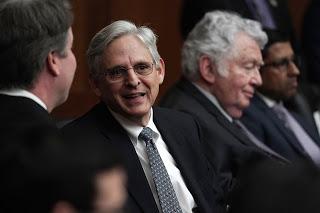
Merrick Garland
The U.S. Senate is holding confirmation hearings this week for Merrick Garland, Joe Biden's nominee as attorney general. The story hits close to home for several reasons. Former U.S. Sen. Doug Jones (D-AL) was considered a front runner until Biden gave the nod to Garland, More importantly, Garland (if confirmed) faces a huge task. From a New York Times e-newsletter:
Should he be confirmed, Judge Garland will take over what prosecutors are calling the biggest, most complex investigation in Justice Department history, of the Capitol assault that led to the second impeachment of President Donald J. Trump. Prosecuting domestic terrorism was formative work for Judge Garland, who oversaw the investigation of the 1995 Oklahoma City bombing and similar cases.
As federal prosecutors unveil charges in the attack on the Capitol, they have repeatedly highlighted how two militant groups — the Oath Keepers and the Proud Boys — had an outsize role in the assault.
The Washington Post reports on Garland's priorities:
Attorney general nominee Merrick Garland plans to tell the Senate that if confirmed to become the nation’s top law enforcement official, he will strive to lead an agency committed to battling discrimination in American life and extremist attacks on democracy.
In written remarks prepared for delivery at his confirmation hearing before the Senate Judiciary Committee, Garland, 68, highlighted the history of the Justice Department, noting that the agency was formed in the aftermath of the Civil War, and that many of the issues it confronted then remain pressing concerns today.
Saying America “does not yet have equal justice,” Garland plans to tell lawmakers: “Communities of color and other minorities still face discrimination in housing, education, employment, and the criminal justice system; and bear the brunt of the harm caused by pandemic, pollution, and climate change.”
Garland said his confirmation would be “the culmination of a career I have dedicated to ensuring that the laws of our country are fairly and faithfully enforced, and that the rights of all Americans are protected.”
The Biden administration has pitched Garland as a welcome antidote to years of pitched political battles that have weakened the Justice Department, and he has been praised by civil rights groups as well as the Fraternal Order of Police and the International Association of Chiefs of Police.
Garland’s nomination also has public support from more than 150 former Justice Department officials of both parties, and 61 former federal judges. His former colleagues say his experience prosecuting domestic terrorism cases makes him a good choice to oversee the department at a time it is dealing with the growing threat of domestic terrorism, including a massive investigation into the hundreds of people who stormed the U.S. Capitol last month in support of President Donald Trump.
Garland gave up a lifetime job as a federal judge to accept the AG nomination:
Garland spent the past two decades as a federal appellate judge in D.C., and during the Obama administration was nominated to the Supreme Court, but Senate Republicans refused to consider his nomination.
At the confirmation hearing, Republicans are expected to try to extract promises of specific investigations and prosecutions in political cases, and have already publicly called for the judge to commit to investigating the administration of New York Gov. Andrew M. Cuomo, a Democrat, for his handling of nursing home deaths related to the coronavirus pandemic.
As a judge, Garland has been known as a moderate with a knack for building consensus. Cabinet nominees often seek to deflect demands for specific actions or policy goals, and Garland’s current job as a judge may lead him to be even more circumspect in his answers.
Garland is well versed in the challenges that domestic terrorism presents:
Before becoming a judge, Garland was best known in legal circles for his role guiding the investigation and prosecution of Timothy McVeigh, the man who detonated a bomb outside a federal building in Oklahoma City in 1995, killing 168 people. McVeigh was convicted and sentenced to death, and in 2001 he was executed.
“From 1995 to 1997, I supervised the prosecution of the perpetrators of the bombing of the Oklahoma City federal building, who sought to spark a revolution that would topple the federal government. If confirmed, I will supervise the prosecution of white supremacists and others who stormed the Capitol on January 6 — a heinous attack that sought to disrupt a cornerstone of our democracy: the peaceful transfer of power to a newly elected government.”
That work, he said, is “but a part” of the broad range of Justice Department responsibilities to protect the country from “environmental degradation and the abuse of market power, from fraud and corruption, from violent crime and cybercrime, and from drug trafficking and child exploitation.”
